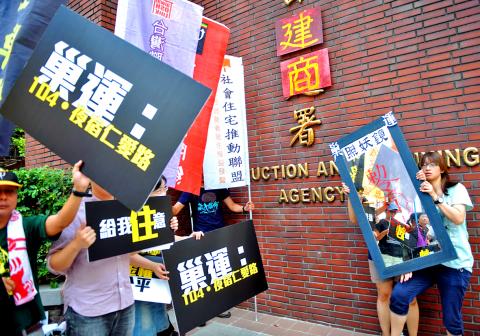Several civic groups yesterday protested outside the Construction and Planning Agency (CPA) in Taipei, calling it the “construction companies’ agency” and “accomplice” in real-estate speculation which sacrifices the public’s interests to benefit contractors.
“The CPA is undoubtedly an agency for construction companies and for real-estate speculation,” Taiwan Association for Human Rights executive secretary Wang Pao-hsuan (王寶萱) told reporters.
“The controversial expropriation projects in Dapu (大埔) [Miaoli County] and the Taoyuan Aerotropolis were all decided in this building behind me,” she said, referring to the agency’s offices.

Photo: Wang Min-wei, Taipei Times
The Taoyuan Aerotropolis project initially only required about 1,000 hectares of land, but “in five years, land designated for expropriation has grown to 3,000 hectares,” Wang said.
She added that the project was approved by the agency during the tenure of former director-general Yeh Shih-wen (葉世文), who is under investigation for allegedly accepting bribes in exchange for approving several development projects, while former National Taipei University of Technology professor Tsai Jen-hui (蔡仁惠), who allegedly served as a middleman between Yeh and construction companies, was a member of the review committee that approved the project.
Peng Yang-kai (彭揚凱), spokesperson for the recently launched Housing Movement, said that while the CPA is one of the government agencies in charge of housing policies and is supposed to help solve the housing problem, “it is only creating more problems.”
Peng said that the demand for housing is high, but the agency has been focused on pushing urban renewal projects that would turn old apartment buildings into expensive luxury apartment complexes that not many can afford to buy.
“After encouraging speculation in Taipei and New Taipei City, the CPA is now doing it elsewhere — the Taoyuan Aerotropolis project is an example,” Peng said. “Not long after, we may have ghost towns with housing complexes that no one lives in — like those in China.”
Taiwan Alliance for Victims of Urban Renewal president Peng Lung-san (彭龍三) agreed, saying that the government should be concerned about the right of abode for all — and not about increasing property values.
“Decades ago, when I purchased the place where I now live and run my small scooter repair shop in Taipei, it only cost about NT$1 million [US$33,000],” Peng Lung-san said.
“However, with the urban renewal projects going on, property prices [in the area] have soared to about NT$1 million per ping [3.3m2] — and yet, the government continues to push for more urban renewal projects,” he said.
He added that the calling the CPA the “construction companies’ agency” is appropriate, because when the agency approves an urban renewal project initiated by a construction firm, it needs to help expropriate the land, demolish the original buildings and deal with the legal issues when needed.
“A construction company may make tens of billions of NT dollars from [an urban renewal] project, but neither the government nor the ordinary people would get a penny out of it,” Peng Lung-san said.
The groups ended the protest by sticking signs onto the CPA’s signboard, changing the name of the agency to “construction companies’ agency.”

Taiwan is to commence mass production of the Tien Kung (天弓, “Sky Bow”) III, IV and V missiles by the second quarter of this year if the legislature approves the government’s NT$1.25 trillion (US$39.78 billion) special defense budget, an official said yesterday. Commenting on condition of anonymity, a defense official with knowledge of the matter said that the advanced systems are expected to provide crucial capabilities against ballistic and cruise missiles for the proposed “T-Dome,” an advanced, multi-layered air defense network. The Tien Kung III is an air defense missile with a maximum interception altitude of 35km. The Tien Kung IV and V

The disruption of 941 flights in and out of Taiwan due to China’s large-scale military exercises was no accident, but rather the result of a “quasi-blockade” used to simulate creating the air and sea routes needed for an amphibious landing, a military expert said. The disruptions occurred on Tuesday and lasted about 10 hours as China conducted live-fire drills in the Taiwan Strait. The Civil Aviation Administration (CAA) said the exercises affected 857 international flights and 84 domestic flights, affecting more than 100,000 travelers. Su Tzu-yun (蘇紫雲), a research fellow at the government-sponsored Institute for National Defense and Security Research, said the air

Taiwan lacks effective and cost-efficient armaments to intercept rockets, making the planned “T-Dome” interception system necessary, two experts said on Tuesday. The concerns were raised after China’s military fired two waves of rockets during live-fire drills around Taiwan on Tuesday, part of two-day exercises code-named “Justice Mission 2025.” The first wave involved 17 rockets launched at 9am from Pingtan in China’s Fujian Province, according to Lieutenant General Hsieh Jih-sheng (謝日升) of the Office of the Deputy Chief of the General Staff for Intelligence at the Ministry of National Defense. Those rockets landed 70 nautical miles (129.6km) northeast of Keelung without flying over Taiwan,

A strong continental cold air mass is to bring pollutants to Taiwan from tomorrow, the Ministry of Environment said today, as it issued an “orange” air quality alert for most of the country. All of Taiwan except for Hualien and Taitung counties is to be under an “orange” air quality alert tomorrow, indicating air quality that is unhealthy for sensitive groups. In China, areas from Shandong to Shanghai have been enveloped in haze since Saturday, the ministry said in a news release. Yesterday, hourly concentrations of PM2.5 in these areas ranged from 65 to 160 micrograms per cubic meter (mg/m³), and pollutants were